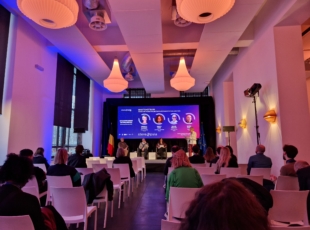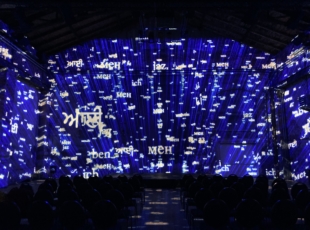Alex Stevens, DIY innovation

Article author :
Possessing a sharp sense of resourcefulness, a degree in computing and an unrelenting expertise in terms of music programming, the former Dour festival programmer now heads Music Data Studio, a startup providing a mixture of advice, toolkits and data tailored to the needs of the sector’s professionals.
I create lots of micro-tools which make my everyday life easier, which means that I am ultra-effective’, Alex Stevens informs us, a tad ironically, from the sofa he is comfortably ensconced on. Having just returned from his holidays, he tells us, not without a measure of pride, that he has very recently devised a system to transfer his WhatsApp messages to his mailbox. ‘I am a bit of a hacker,’ he adds, cheerfully. A hacker, to be sure, but a hacker who is tried and tested. In a career spanning 25 years, the Liégeois has developed a shedload of systems each more ingenious than the last, aiming to offer ever increasing automatization, resource pooling and facilitation within the music sector.
Dour, a limitless playground
It was at the Dour festival, for which he worked for close on twenty years, that everything began: after having launched Nameless – his own music magazine – Alex was entrusted with the programming for one of the festival’s stages. At that same time, he was embarking on computer studies and suggested several tooling suggestions to the Walloon festival, in particular as far as communication is concerned. ‘We straightaway established a discussion forum so that we could speak to the festival-goers, ask them for their opinions, etc. It was pretty innovative to have this community, this direct interaction with the fans,’ he remembers. ‘I was always offering new ideas I picked up from here, there and everywhere, be it for creating tools to manage volunteers or the management of the programming. In 2006, I developed an accreditation management tool, at a time when there was hardly any electronic ticketing in use: people would go and buy their tickets at FNAC,’ he adds.
A few years later, Alex took over the reins of the whole of the festival’s programming, with innovation continuing to be his hobby horse. Juggling between communication, scheduling and the development of new devices such as Mécano – a production support tool which he subsequently sold to the Antwerp startup Beatswitch – , he started to take an interest in data and retrieved data generated by the audience to improve the festival’s offer. ‘It was around that time that I created the very first prototypes of the tools I am currently offering to other festivals, such as Bookr.fm. The first version was called Bandbook, it was the equivalent of Facebook but with groups, a kind of internal MySpace,’ he explains.

On the strength of 18 years of programme management at the Dour festival, in 2018 Alex founded the KuratedBy structure, with a view to pooling the scheduling of independent festivals. ‘We met the agents and pooled those who were on tour. That enabled us to make double offers, to gather the info we had via France to make use of it in Belgium, and vice versa.’ A structure he closed a year ago. Today, he has his own solo agency, Olakala.
Bookr.fm, a collaboration and internal management tool
It is this concept of pooling which is in particular the focus of Bookr.fm, the software programme Alex Stevens placed on the market last year. A complete facilitation tool tailored to festival scheduling teams, Bookr.fm is the all-in-one solution to aid programmers in constructing their lineups: individual and communal curation, communication, drawing up contracts or the management of budgets, everything – or as good as – can be carried out via the platform.
Fed by the Music Data Studio database – which indexes over 850,000 profiles of artists worldwide – the tool allows programming teams to visualise, analyse and classify the files of the artists which may be of interest them. The principle is simple: using a data packet – such as an artist’s Spotify listener ratings, their Last.fm bio, their tour dates and venues, or the media outlets which have chronicled them – the platform creates a profile which is added to the database. ‘The idea is not to overwhelm you with data. It is to allow you to see whether or not you are well informed enough to make decisions. The tool doesn’t make the decision in your place,’ Alex clarifies. ‘When you talk about data, you think you are only talking about the quantitative. In my opinion, data can be quantitative and qualitative. An artist who is listened to by 100 listeners a month, that is a piece of info. But if the artist has an article in Pitchfork and has been played by DJ Lefto, that changes everything,’ he adds.
In addition to the artists’ files, Bookr.fm offers a whole series of internal management tools: ‘It’s a CRM (Customer Relation Management) system for managing budgets and offers. On the tool, you can generate pre-contacts for the artists.’

AI and data, words which strike fear in the music industry
In a sector based on the emotional, on networks and human relationships, concepts such as ‘data’ and ‘artificial intelligence’ are off-putting to some people. ‘The live music sector is very wedded to the human aspect. Programmers schedule an artist because they know their agent, because they trust their agent, because their daughters listen to the artist. Music, it’s an interpersonal sector,’ emphasises Alex. ‘Me, I try to help the festivals better understand their public to optimise their choices. […] For me, the future of music programming is a mix of the two: the relational, the human, what you feel when you are listening to music, and then a little bit of data, a little bit of knowing your audience so you are not conned. It is not one or the other, it is one and the other. Bookr.fm is a tool to aid decision-making,’ he adds. A tool which, despite the fears, can already point to considerable success: amongst others, the teams working for Couleur Café, Marsatac, Sakifo Musik Festival and Plissken Festival have already adopted it.
Even so, one question is niggling away: does not the use of such a tool risk flattening out the programmes? The response Alex gives is crystal-clear: ‘today, without Bookr.fm, the programmes already all resemble one another […] The programmers copy and paste, because it is reassuring. Me, with my tool, I want to do the opposite of that.’ Making a difference by creating unique and made-to-measure programmes, in line with the identity of a festival and its audience, that is what Alex Stevens is offering. ‘The data enables me to be more efficient in my quest for that: by cross-referencing the data, by looking at the criteria, I will unearth new artists and listen to artists which the others have not yet come across, rather than merely doing what the person next to me is doing,’ he explains, before adding. ‘All the data is out there, but you will not look at the same data depending on your profile. Bookr.fm is a calculator, a tool to help you get there quicker, but it will not do the curation work for you. So it will not flatten out the programmes. What flattens out the programmes is the fact that people operate on a copy and paste basis of what others are doing because they find it reassuring.’
A story, projects or an idea to share?
Suggest your content on kingkong.
also discover

From Belgium to Japan, the new territories of creative digital creativity

Stereopsia, the key European immersive technologies hub

NUMIX LAB 2024: creating bonds and building the future of digital creativity


